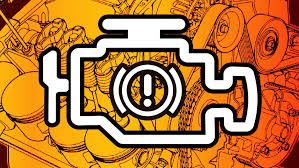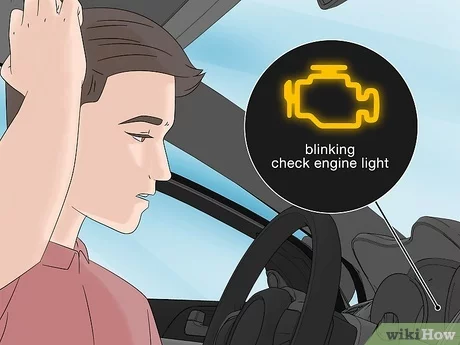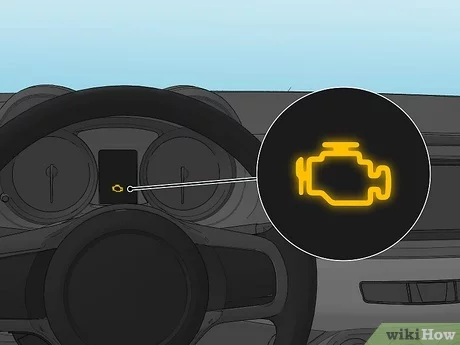


The check engine light is an important indicator in modern vehicles that alerts the driver to potential issues with the vehicle's engine or emission control systems. It is part of the On-Board Diagnostics (OBD) system, which continuously monitors various components and systems in the vehicle. When the check engine light comes on and goes off randomly, it can be perplexing and concerning for drivers.

Over the years, I've identified several common causes that can trigger the check engine light to flicker on and off like a mischievous firefly. Let's dive into the usual suspects:
You might be surprised to learn that something as simple as a loose or damaged gas cap can be the root cause of your check engine light woes. When the gas cap isn't properly secured or has developed cracks or leaks, fuel vapors can escape, triggering the check engine light intermittently. It's one of the most common and easily fixable issues, so always start by checking the gas cap first.
The oxygen sensor is a crucial component that monitors the air/fuel mixture in your engine. When it starts to malfunction or fail, it can send incorrect data to the engine computer, causing the check engine light to come on and off randomly. These sensors can be temperamental, and their performance can be affected by various factors, including age, contamination, and exposure to extreme temperatures.
Faulty spark plugs or ignition coils can also be the culprits behind the intermittent check engine light. These components play a vital role in the ignition system, and when they start to fail, they can cause misfires, which can trigger the check engine light to turn on and off randomly.
Your engine's intake system relies on a precise balance of air and fuel, and any vacuum leaks can disrupt this delicate equilibrium. These leaks can be caused by damaged hoses, gaskets, or other components, and they can cause the check engine light to come on and off randomly as the air/fuel mixture fluctuates.
Loose or damaged wiring connections can also be the source of intermittent electrical problems, leading to the check engine light turning on and off randomly. These issues can be challenging to diagnose, as they may only occur under specific conditions or when certain components are activated.
Your vehicle is equipped with various sensors that monitor different aspects of the engine's performance, such as the mass airflow sensor, throttle position sensor, and camshaft position sensor. When these sensors start to fail intermittently, they can send erratic signals to the engine computer, causing the check engine light to come on and off randomly.

Now that we've explored the potential causes, let's dive into the process of diagnosing and repairing the issue:
The first step is to perform a thorough inspection and diagnosis. Start by checking for any loose or damaged gas cap, and tighten or replace it if necessary. Next, use an OBD-II scanner to retrieve diagnostic trouble codes (DTCs) from the vehicle's computer. These codes can provide valuable clues about the specific issue causing the intermittent check engine light.
Once you have the codes, perform visual inspections of wiring harnesses, vacuum hoses, and other components related to the retrieved DTCs. Don't forget to check for any pending or historical codes stored in the vehicle's computer, as these can provide additional insights into intermittent issues.
If the issue persists after these initial checks, a professional mechanic may need to perform more in-depth diagnostic tests, such as monitoring live data or conducting component tests.
| Diagnostic Step | Description |
|---|---|
| Check Gas Cap | Inspect for loose or damaged gas cap, tighten or replace if necessary |
| Retrieve DTCs | Use an OBD-II scanner to retrieve diagnostic trouble codes |
| Visual Inspection | Check wiring harnesses, vacuum hoses, and components related to DTCs |
| Check Pending/Historical Codes | Review any pending or historical codes stored in the vehicle's computer |
| Advanced Diagnostics | Perform live data monitoring or component tests if needed |
Armed with the diagnostic information, it's time to tackle the repair. For a loose or faulty gas cap, the solution is simple: tighten or replace it. If the issue lies with faulty oxygen sensors, spark plugs, ignition coils, or other components, replace them according to the manufacturer's recommended procedures.
If you've identified damaged wiring harnesses or connectors, repair or replace them as necessary. And if vacuum leaks are the culprit, seal them by replacing damaged hoses or gaskets.
| Repair | Description |
|---|---|
| Gas Cap Replacement | Tighten or replace loose or faulty gas cap |
| Component Replacement | Replace faulty oxygen sensors, spark plugs, ignition coils, or other components |
| Wiring Repair/Replacement | Repair or replace damaged wiring harnesses or connectors |
| Vacuum Leak Repair | Seal vacuum leaks by replacing damaged hoses or gaskets |
Once the issue has been resolved, it's essential to take preventive measures to avoid future occurrences. Perform regular maintenance, such as replacing air filters, spark plugs, and oxygen sensors, as recommended by the manufacturer. Inspect and replace the gas cap during routine maintenance, and check for any loose connections, damaged wiring, or vacuum leaks during regular inspections.
Additionally, avoid aggressive driving or extreme conditions that can stress the engine and its components, as these can contribute to premature wear and failure.
Replace air filters, spark plugs, and oxygen sensors as per manufacturer's recommendations
Inspect and replace gas cap during routine maintenance
Check for loose connections, damaged wiring, or vacuum leaks during inspections
Avoid aggressive driving or extreme conditions
The cost of repairs can vary depending on the specific issue and the make and model of your vehicle. Here are some approximate costs for common repairs:
| Repair | Approximate Cost |
|---|---|
| Gas Cap Replacement | $10 - $50 |
| Oxygen Sensor Replacement | $200 - $400 (including labor) |
| Spark Plug Replacement | $100 - $300 (including labor) |
| Ignition Coil Replacement | $150 - $400 (including labor) |
| Vacuum Hose or Gasket Replacement | $50 - $200 (including labor) |
| Wiring Repair or Replacement | $100 - $500 (depending on the extent of the issue) |
It's important to note that these costs are approximate and can vary based on your location, the specific make and model of your vehicle, and the labor rates of the repair shop. Always get a quote from a reputable mechanic before proceeding with any repairs.
The intermittent check engine light can be a frustrating and perplexing issue, but with the right knowledge and approach, it's a problem that can be solved. By understanding the potential causes, performing thorough inspections and diagnoses, and following proper repair procedures, you can bid farewell to the flickering check engine light and enjoy a smooth, worry-free driving experience.
Remember, preventive maintenance is key to avoiding future issues, so stay on top of your vehicle's routine service schedule and address any concerns promptly. With a little patience and the guidance of a skilled mechanic, you'll be back on the road in no time, leaving the check engine light mystery in the rearview mirror.
A loose or faulty gas cap is often the most common culprit behind an intermittent check engine light. Tightening or replacing the gas cap can resolve the issue in many cases.
Yes, a malfunctioning oxygen sensor can send incorrect data to the engine computer, causing the check engine light to turn on and off randomly.
Vacuum leaks can disrupt the precise air/fuel mixture balance in the engine's intake system, leading to the check engine light flickering on and off intermittently.
Loose or damaged wiring connections can cause intermittent electrical problems, resulting in the check engine light turning on and off randomly.
Yes, various sensors like the mass airflow sensor, throttle position sensor, and camshaft position sensor can send erratic signals to the engine computer when failing, causing the check engine light to flicker.
Mechanics use OBD-II scanners to retrieve diagnostic trouble codes, perform visual inspections, and may conduct live data monitoring or component tests to pinpoint the cause.
Common repairs include replacing the gas cap, oxygen sensors, spark plugs, ignition coils, sealing vacuum leaks, or repairing/replacing damaged wiring.
Regular maintenance, such as replacing air filters, spark plugs, and oxygen sensors, as well as inspecting for loose connections and vacuum leaks, can help prevent recurrence.
Yes, aggressive driving or exposing the engine to extreme conditions can stress the components and contribute to premature wear and failure, potentially causing an intermittent check engine light.
The cost can vary, but common repairs like gas cap replacement ($10-$50), oxygen sensor replacement ($200-$400), and wiring repairs ($100-$500) are typical cost ranges.

Sarah isn't your average gearhead. With a double major in Mechanical Engineering and Automotive Technology, she dived straight into the world of car repair. After 15 years of turning wrenches at dealerships and independent shops, Sarah joined MICDOT to share her expertise and passion for making cars run like new. Her in-depth knowledge and knack for explaining complex issues in simple terms make her a valuable asset to our team.












